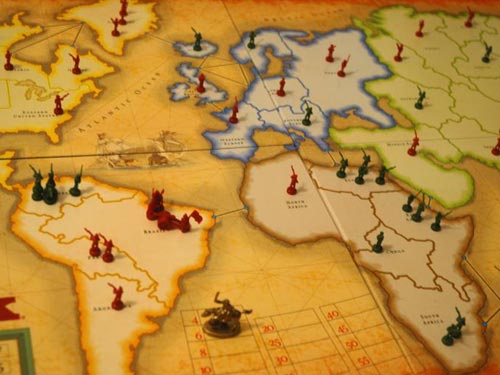So I’ve been learning how to make game server recently, and for application one idea come to my mind, and I’m looking for comment/support to decide whether to realize it.
The idea actually originated from the origin of Go. As we know Go is an abstraction of war in ancient China.
So I’m thinking maybe I could create a war game, but battle result is based on a game on OGS between combatants. Kind of like Risk I think, without the units.
Idea detail is described below: (all numbers are rough guess)
In the beginning there will be 2 or 3 kingdoms/countries/empires (you name it, your choice), each have 4 or 5 generals (which represent the players).
There would be a world map (Let’s call it Tianxia to make it more thematic! xD) with many territories (maybe 20-30), and each general can move around and fight for those territories.
The game will be decided when
- One kingdom claims maybe 80% territories of Tianxia,
- Or when a certain real life time has passed (let’s say 2 months), at which point the winner is the kingdom with most territories.

The game progress in turns, where each 2 hours in real life is one turn:
- Moving one step inside your kingdom’s territory take 1 turn (2 hours).
- Moving one step inside an undefended enemy territory take 3 turns (6 hours). After that you claim the territory as yours.
- Moving into an occupied enemy territory will initiate one game on OGS against each general(s) defending that territory. The result of those games decide ownership of the territory.
Battle rules in detail:
-
When you move into an occupied enemy territory, for each enemy player currently there, the game will automatically create a game on OGS against that player. (technically possible right? Not 100% sure)
-
The attacker must win ALL of those games in order to capture the territory (so more defenders = better defense)
-
If you lose the combat, you must withdraw to an adjacient friendly territory. You are forbidden from entering the battle zone again until the ownership of that location has been decided.
-
When you are locked in a battle, you can’t move away from the location. But of course you can always choose to resign on OGS and then move away.
-
Other people from both side can freely join the fight, the same combat rule applies.
-
As soon as one attacker successfully defeat all defenders, the territory is claimed and the remaining unfinished OGS games will have no further effect on the ownership.
For those reasons, created OGS games most likely will be Unranked games (so you can do things like strategic resign to move to more urgent locations).
Games are of course correspondence, but to reflect the pressure of war probably they should be quite fast (maybe Fischer 3 days + 6 hours). Actually my idea is just so that the journalists of us can have new things to comment on the state of the war regularly xD
So anyway in general it will be roughly the same length as a correspondence tournament, but has more time pressure - your opponent can make a quick thrust into undefended territories in the middle of the night while you were sleeping.
Anyway, the point of this thread is that, it is all still just my idea, and new year’s coming so maybe I can have a free week to actually make that. Problem is:
Is this idea interesting for you? Would you like to join for one game?
Are you sure you can be online fairly regularly for 2 months straight and fight for your kingdom?
In the end if there’s not enough players to even start a single game, I’d rather spend time making another single player game because someone can play it.
Hence the pool:
- I have read the post and answer “Yes”
- I have read the post and answer “No”
- Man that’s a long post where’s the potato? Didn’t read.
0 voters
Comments are greatly appreciated 